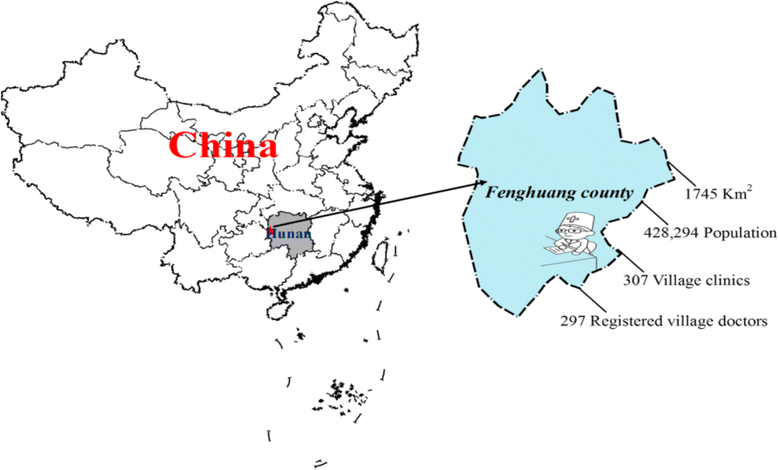"What do you know?"--knowledge among village doctors of lead poisoning in children in rural China
- PMID: 29169343
- PMCID: PMC5701361
- DOI: 10.1186/s12889-017-4895-2
"What do you know?"--knowledge among village doctors of lead poisoning in children in rural China
Abstract
Background: This study evaluates the extent of village doctors' knowledge of lead poisoning in children in rural China and assesses the characteristics associated with possessing accurate knowledge.
Methods: A cross-sectional, questionnaire-based survey of 297 village doctors in Fenghuang County, Hunan Province, China was conducted. All village doctors were interviewed face-to-face using a "What do you know" test questionnaire focusing on prevention strategies and lead sources in rural children.
Results: A total of 287 (96.6%) village doctors completed the survey in full. Most village doctors had an appropriate degree of general knowledge of lead poisoning; however, they had relatively poor knowledge of lead sources and prevention measures. Village doctors with an undergraduate level education scored an average of 2.7 points higher than those who had a junior college level education (p = 0.033). Village doctors with an annual income ≤ 10,000 RMB yuan scored 1.03 points lower than those whose income was >10,001 RMB yuan. Ethnic Han village doctors scored 1.12 points higher, on average, than ethnic Tujia village doctors (p = 0.027).
Conclusions: This study identified important gaps in knowledge concerning lead poisoning in children among a rural population of village doctors. There is a clear need for multifaceted interventions that target village doctors to improve their knowledge regarding lead poisoning in children. The "What do you know" questionnaire is a new tool to evaluate lead poisoning knowledge and education projects.
Keywords: Children; China; Lead poisoning; Village doctors.
Conflict of interest statement
Ethics approval and consent to participate
The Ethics Committee of the Xiangya School of Public Health, Central South University, and The Yale Human Subjects Committee(IRB Protocol ID: 2,000,020,374) granted ethical approval for the study. Oral consent forms were speak to the participants before answering survey questions, and participants were informed that they could withdraw at any point. According to the YALE UNIVERSITY IRBs guidelines, in certain circumstances, the IRB may grant a waiver of documentation of consent, including the research doesn’t pose greater than minimal risk and a breach of confidentiality doesn’t constitute the principal risk to participants. Our study has obtained verbal consent and has approved by the YALE UNIVERSITY human investigation committee because the written informed consent can be waived per federal regulation 45 CFR 46.117(C).
Consent for publication
Not applicable.
Competing interests
The authors declare that they have no competing interests.
Publisher’s Note
Springer Nature remains neutral with regard to jurisdictional claims in published maps and institutional affiliations.
Figures
Similar articles
-
Antibiotic prescribing of village doctors for children under 15 years with upper respiratory tract infections in rural China: A qualitative study.Medicine (Baltimore). 2016 Jun;95(23):e3803. doi: 10.1097/MD.0000000000003803. Medicine (Baltimore). 2016. PMID: 27281082 Free PMC article.
-
Determinants of village doctors' job satisfaction under China's health sector reform: a cross-sectional mixed methods study.Int J Equity Health. 2017 Apr 18;16(1):64. doi: 10.1186/s12939-017-0560-8. Int J Equity Health. 2017. PMID: 28420396 Free PMC article.
-
Does exam-targeted training help village doctors pass the certified (assistant) physician exam and improve their practical skills? A cross-sectional analysis of village doctors' perspectives in Changzhou in Eastern China.BMC Med Educ. 2018 May 11;18(1):107. doi: 10.1186/s12909-018-1211-5. BMC Med Educ. 2018. PMID: 29751800 Free PMC article.
-
Is it high time to leave the chronic disease care of rural older people to village doctors in China: Insights from a population-based atrial fibrillation screening study.Curr Probl Cardiol. 2024 Oct;49(10):102759. doi: 10.1016/j.cpcardiol.2024.102759. Epub 2024 Jul 25. Curr Probl Cardiol. 2024. PMID: 39067720 Review.
-
Preferences for training needs of village doctors in China: a systematic review.Fam Pract. 2024 Dec 2;41(6):874-882. doi: 10.1093/fampra/cmad063. Fam Pract. 2024. PMID: 37300310
Cited by
-
Comparison of knowledge of occupational hazards of lead exposure and blood lead estimation among roadside and organized panel beaters in Enugu metropolis, Nigeria.Pan Afr Med J. 2021 Sep 17;40:47. doi: 10.11604/pamj.2021.40.47.28281. eCollection 2021. Pan Afr Med J. 2021. PMID: 35059099 Free PMC article.
-
Frequency of Depression-Related Symptoms in Caregivers of Patients with Silicosis.J Healthc Eng. 2019 Feb 11;2019:6035920. doi: 10.1155/2019/6035920. eCollection 2019. J Healthc Eng. 2019. PMID: 30886686 Free PMC article.
-
Knowledge, attitude, and practices related to lead pollution among adolescents and caregivers of young children living near Used Lead Acid Battery (ULAB) recycling sites in Bangladesh: a cross-sectional study.BMC Public Health. 2024 Aug 5;24(1):2108. doi: 10.1186/s12889-024-19533-3. BMC Public Health. 2024. PMID: 39103827 Free PMC article.
-
Severe Abdominal Pain as a Presentation of Lead Poisoning: A Case Presentation.Int Med Case Rep J. 2023 Apr 8;16:245-249. doi: 10.2147/IMCRJ.S404885. eCollection 2023. Int Med Case Rep J. 2023. PMID: 37066133 Free PMC article.
References
-
- Bose-O'Reilly S, Yabe J, Makumba J, Schutzmeier P, Ericson B, Caravanos J.Lead intoxicated children in Kabwe, Zambia.Environ Res. 2017. doi:10.1016/j.envres.2017.10.024. - PubMed
MeSH terms
Grants and funding
LinkOut - more resources
Full Text Sources
Other Literature Sources
Medical


